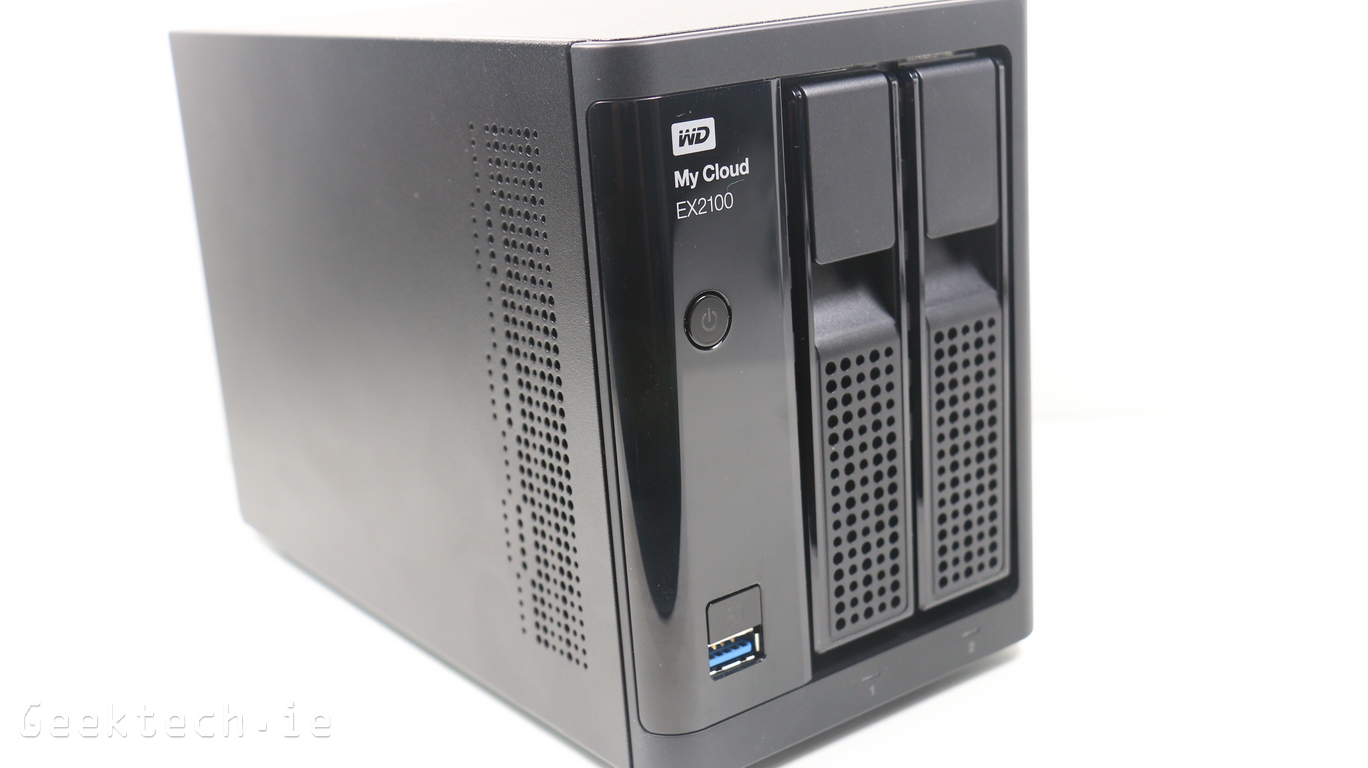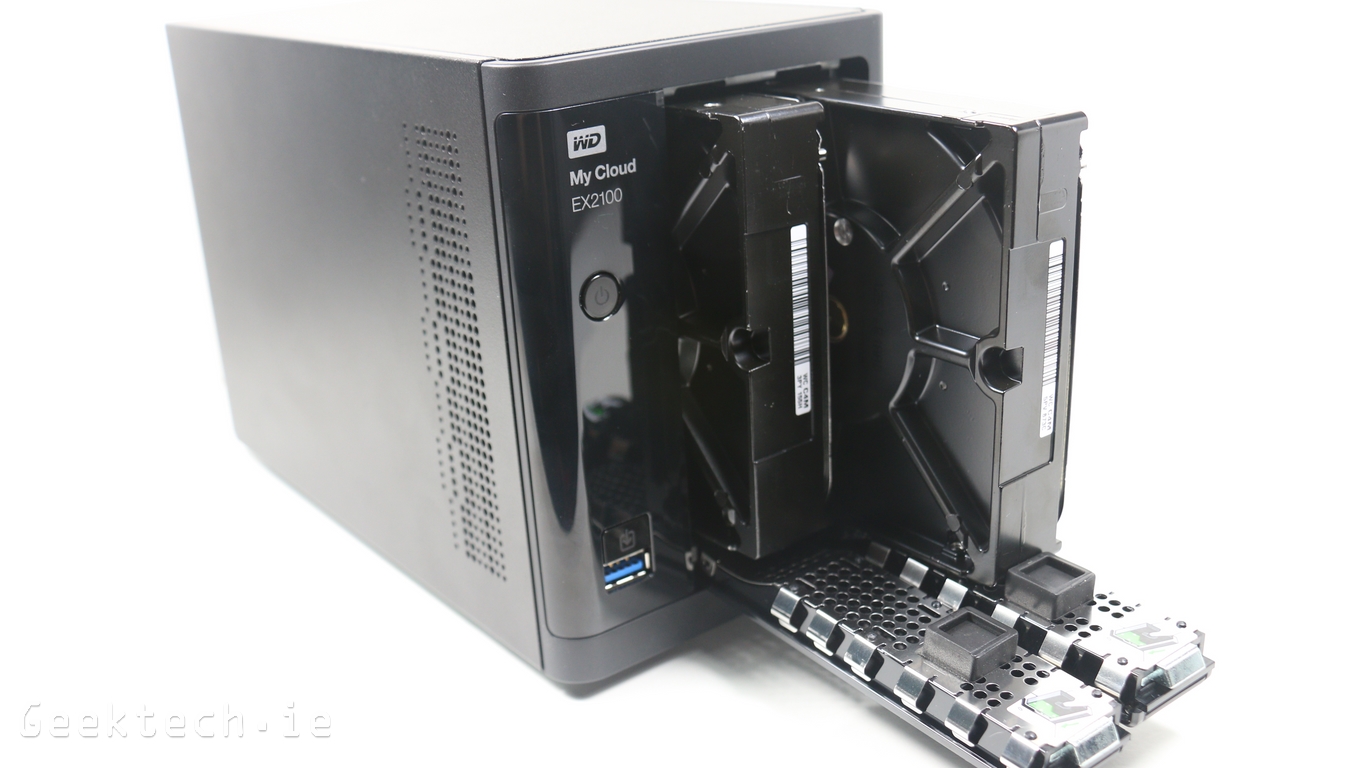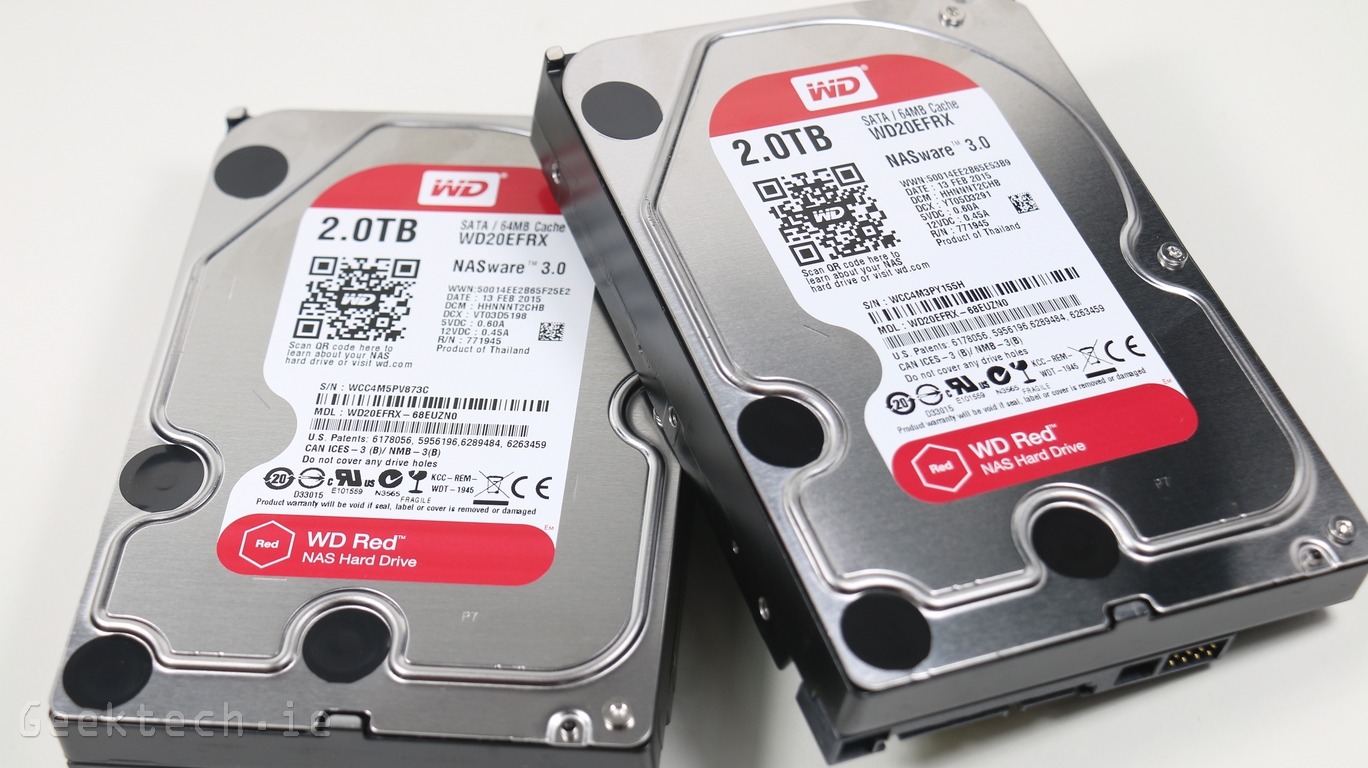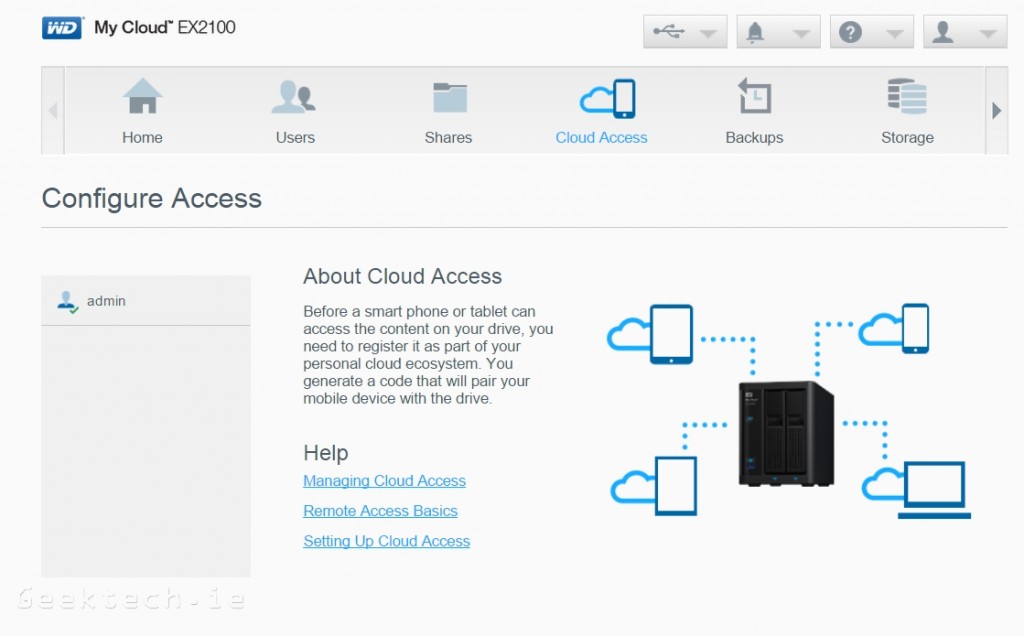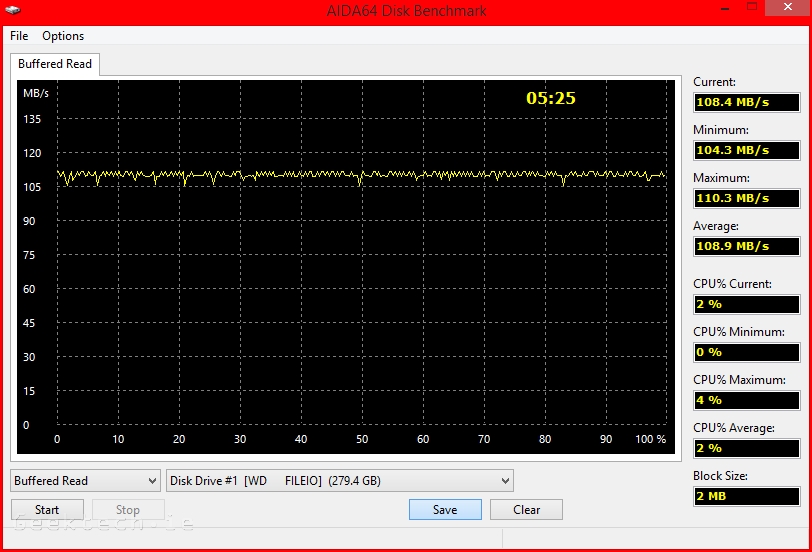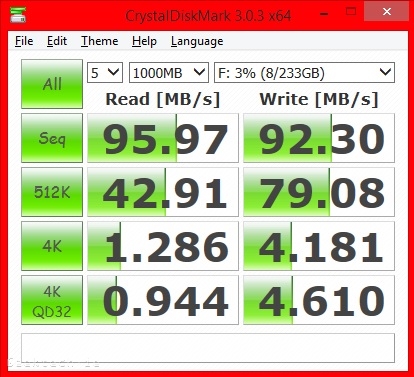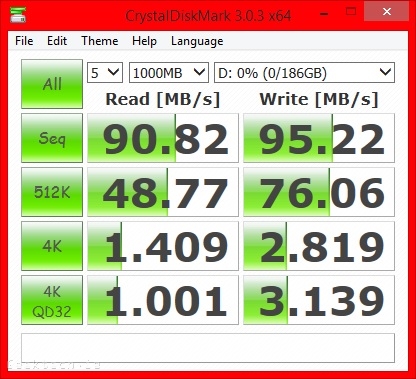Flash drives, memory cards, cloud storage and more. these are all great ways of sharing files across computers, but they’re neither fast or big enough for a business needs. This is where a NAS comes into play. Network Attached Storage (NAS) brings you local or online storage by connecting hard drives to your network. The NAS itself houses all of the hardware including a processor and OS to give you a decent array of abilities depending on the type of NAS you pick up.
The EX2100 from WD offers a 2 bay NAS with dual core 1.6GHz CPU and 1GB of RAM. We also have 2 USB 3.0 connections with one on the back and one of the front with a one touch back-up button. Dual gigabit Ethernet are present and offer daisy chaining abilities. Below are the full specs, so let’s take a closer look at the unit itself.
Specifications
[accordion title=”Specifications” id=”specs”]
Interface
- Gigabit Ethernet x 2
- Power supply (DC in) x 1
- USB 3.0 expansion port x 1 rear
- USB 3.0 port with direct copy x 1 front
CPU
- Marvell® ARMADA® 385 1.3 GHz dual-core
Memory
- 1 GB DDR3
Drive bays
- 2 x 3.5 inch hard drive bays, hot swap capable, tray-less design
Internal hard drives
- WD Red NAS hard drives
External Ports
- 2 USB 3.0 ports ( 1 x back side; 1 x front side with direct copy button)
System Requirements
- Windows 8.1, Windows 7, or Windows Vista, operating system
- Mac OS X Yosemite, Mavericks, Mountain Lion, or Lion operating systems
- DLNA/UPnP devices for streaming
- Router with Internet connection
Supported Web Browsers
- Internet Explorer 10 or higher
- Safari 6 or higher
- Firefox 30 or higher
- Google Chrome 31 or higher on supported Windows and Mac OS platforms
Network Protocols
- DHCP Client or Static IP
- NTP Client
- Dynamic DNS (DDNS)
- Apple Bonjour and Windows Rally
- Jumbo frame support up to 9K
- VLAN (802.1Q)
- Link Aggregation and failover for 2 Gigabit Ethernet ports
- UPnP port forwarding
- LLTD Link Layer Topology Discovery Protocol
- iSCSI
- SSH
Network File Services
- OS Supports
- Windows XP Home/ Pro/ 64-bit SP3+
- Windows Vista/ 7/ 8 (All versions)
- Mac OS X 10.6, Lion, Mountain Lion
- CIFS/SMB for Windows, Mac OS X and Linux
- Linux Distributed File System (DFS)
- AFP for Mac OS X
- FTP/SFTP Server
- WebDAV Server
- Microsoft Active Directory support
Backup management
- Remote backups: My Cloud Expert Series to My Cloud Expert Series locally or remotely
- Backup internal files or folders of the device to other files/folders on the NAS or attached USB drive
- WD SmartWare Pro for Windows clients
- Apple Time Machine (10.5.8+) support
- Cloud-based backup services
- Amazon S3
- ElephantDrive (http://home.elephantdrive.com/)
- Disk sync management for the attached USB ports
Disk management
- RAID: JBOD, spanning, 0/1
- RAID migration
- JBOD to RAID 1
- Hot swapping
- Disk roaming
- Array roaming
Security
- Volume Encryption (256 bit AES)
File System
- EXT4 for internal HDD
- Support following formats for externally attached USB drives
- FAT/FAT32
- NTFS (read and write capability)
- HFS+J (case sensitive)
- Linux EXT2, EXT3, EXT4
- Support for mounting ISO-Image
FTP Server
- Support Port Setting
- Set port range of passive FTP
- Option to report external IP in PASV mode
- Client language selection
- Anonymous FTP
- Secure FTP Support
- Support File eXchange Protocol (FXP)
- FTP bandwidth restriction (upstream/downstream)
- IP address block (block access from undesired IP address)
Download Management
- HTTP downloads from a URL to a user specified folder on the NAS
- FTP downloads of files or folders from an FTP server to another files/folders on the NAS
- P2P Download Manager
Power Management
- Drive Spin Up/Down (including Attached WD USB drives)
- Automatic power recovery (with UPS)
- Schedule power on/off
- Graceful shutdown on UPS low battery
- FAN Control
- Network UPS
- Wake On LAN
Remote Access
- My Cloud mobile app
- My Cloud desktop app
- WD Photos mobile app
User/Group Management
- Max No. of Users: 512 for Samba, 800 for ADS
- Max No. of User Groups: 64 for Samba, 200 for ADS
- Max No. of Network Shares: Max No. of Network Shares: 128
- Max concurrent CIFS connections: 10
- User/Group assignment for network sharing/FTP
- Quotas for groups or users
- Assignment of users to multiple groups
- Batch assignment of users to groups
- Batch user creation
- Importing users (CSV Delimited Format)
- Importing groups (CSV Delimited Format)
System Management
- System status: Device Information
- Capacity usage status for the external storage
- File category breakdown of how much video, photo, music is stored
- Alert notifications
- Event UI message
- UI Alert (with message acknowledgment required)
- Email notice
- QuickView pop-up message
- RED LED status
- Network recycle
- Support Windows CIFS
- Support Apple AFP
- System/FTP Log (Syslog Client)
- HTTP/S (Web) Administration Interface (HTTP Server)
- Firmware upgrade
- Configuration backup and restore
- SNMPv2
- System Information
- CPU percentage
- RAM usage
- Network performance in MB/s
Media Streaming
- UPnP AV Media server (Twonky)
- DLNA certification
- Support WD TV, WD TV Live, Xbox 360, PlayStation 3, Windows 8, connected TVs, Blu-ray players and digital picture frames
- iTunes Server
Third-party App Support
- aMule – peer to peer file sharing application
- Icecast – media streaming app
- phpBB – Internet forum application
- Joomla! – content management system
- SqueezeCenter – streaming audio server
- phpMyAdmin – My SQL administration tool
- WordPress – blogging tool and content management system
- Transmission – BitTorrent client
iSCSI
- iSCSI Target
- CHAP authentication
- iSNS (Internet Storage Name Service )
- Up to 64 iSCSI Targets
- Volume Virtualization
- Virtual Disk Drive (via iSCSI Initiator)
- Max number of virtual disk drives supported is eight (8)
Power Supply
- Input voltage: 100V to 240V AC
- Input frequency: 50 to 60 Hz
- Output voltage: 12V DC, up to 4A
Temperature
- Operating Temperature: 0° C to 35° C ( 32° F to 95° F)
- Non-op Temperature: -40° C to 70° C (-40° F to 158° F)
Package Contents
- NAS
- Ethernet cable
- Power supply and cable
- Quick Install Guide
[/accordion]
The WD My Cloud EX2100

Setup and OS
Being a NAS were not just dealing with a basic external hard drive. The NAS contains its own OS and with it we have some setup options. Below is a run through of the setup and a breakdown of the options available.
Setup is only a few steps. You will be asked to create a password for the admin account. This gives you complete control of the NAS.
Once created you will have the option of creating individual user profiles. This goes further for restricting access to specific shares and limiting control.
Once setup, you can head over to the main page (the NAS IP address ) and you can log in.
The rather elegant looking home screen gives you a quick breakdown of the current NAS affairs. Our test unit has 2 x 2TB drives and was set up under RAID1 initially and here we can see the full 2TB capacity available under that scenario.
Setting up users is another easy step. You can also put users into specific groups and control their level access, this extends to creating shares for specific groups or everyone.
Cloud access is also integrated into the the NAS unit. This allows you to connect smartphones and tablets to the unit on the go.
The EX2100 includes extensive backup capabilities. USB back up is pretty straight forward, where a USB device can be connected to the front port and everything on it will be backed up directly onto the NAS itself. Remote backups are for added redundancy. This feature allows you to back up your My Cloud system to another server either located on the same network or through the internet. The age old saying of 2 onsite and 1 offsite backups are the best.
Internal backups are exactly that. It’s a feature that simply backs up content that’s already on one storage device on the NAS. Handy if you only need certain data is extra important for back up safety.
Cloud backups are a way of creating backups on the cloud that are accessible over the internet. Basically you can store your NAS content on a cloud based backup service. This two services variable directly on the unit are ElephantDrive and Amazon S3.
Lastly we have Camera back up. This is pretty straight forward and allows you to easily backup all of yours photos directly from your camera. You can copy the photos from the device or simply move them, freeing up the space on your camera at the same time.
Storage options
WD include many options when deciding how to setup your hard drives inside the the unit. The options we have available include RAID 0, RAID 1, Spanning and of course JBOD. Obviously the amount of storage space and share options change depending on your setup. Change from one setup to another is still very easy, but it most cases means a total format of the hard drives before hand.




The NAS drive supports creating iSCSI targets. These gives computers on your network or through the internet block level access to portions of the drive (user defined). Using the latest Windows 8 OS means included Bitlocker support. Another handy feature is included support for adding other iSCSI targets to your WD Cloud and then allowing the device to act upon them as if their local drives. Endless choices for backing up data and sharing content.
Apps
Nearly everything includes app support, and the MY Cloud EX2100 is no different. The basic set of support functions include HTTP, FTP and P2P downloads. Their is also a web file viewer built in.
WD have a list of apps available for download. This includes a good few amazing programs that can turn your NAS into a web server, torrent downloader and more. The software available include phpmyadmin, wordpress, transmission, dropbox and more. Installing apps manually is possible, and since we’re dealing with a Linux based OS, their are countless available.
Testing
Now it’s time to look at some performance numbers from the WD My Cloud EX2100. There are a good few different configuration options available and to make sure we cover the spectrum of options we did the same tests under a few of them. The different tests we include are RAID 0 , RAID 1, and Spanning. Each setup includes both testing over a basic network share (when available) and again under iSCSI.
Raid 1
RAID 1 is a great way to keep your data safe as with RAID 1 the data is written to both hard drives – in case of failure with one of the drives the data is safety stored on the working drive. WD also include an auto-restore function, meaning that if a drive fails, you can remove it and add another and it will copy the data to the other drive and continue if nothing happens. Very handy indeed.
Below is a run through all of the tests using RAID 1. We did both tests twice under a basic network share and again under an iSCSI target. In some cases only the iSCSI target was capable of testing (just Aida64 couldn’t do a network share)
Aida64
Aida 64 is fantastic software for bench-marking hardware. It includes a great many benchmarks for different aspects of a computer. We’re taking a look at the Hard Drive specific benchmarks and ran the tests on the iSCSI target we setup on the WD EX2100.
Linear Read/Write


Average Read/Write Access


Buffered Read/Write
Random Read/Write
Crystal Disk Mark
A fantastic way for quickly determining the speed your storage can offer. The tests can be run multiple times which gives you the average result.
iSCSI
Network Share

Here can see typically hard drive results. The maximum speed were seeing on the sequential side of things is the top end of the gigabit Ethernet. We’re not expecting results higher than this, simply because it’s the best the device can do.
Atto
Another quick way to determine how fast your storage is running. Atto increases the test size as it progresses.
iSCSI

Network Share
Intel NAS Performance Test
iSCSI
| Trace | Results |
| HD Video Playback | 92.4 MB/s |
| 2x HD Playback | 116.3 MB/s |
| 4x HD Playback | 116.9 MB/s |
| HD Video Record | 202.5 MB/s |
| HD Playback and record | 184.5 MB/s |
| Content Creation | 18 MB/s |
| Office Productivity | 87.8 MB/s |
| File Copy to NAS | 183.2 MB/s |
| File Copy from NAS | 95 MB/s |
| Dir copy to NAS | 751.5 MB/s |
| Dir copy from NAS | 48.9 MB/s |
| Photo Album | 22.3 MB/s |
Network Share
| Trace | Results |
| HD Video Playback | 89.2 MB/s |
| 2x HD Playback | 97.6 MB/s |
| 4x HD Playback | 97.2 MB/s |
| HD Video Record | 147.7 MB/s |
| HD Playback and record | 91.2 MB/s |
| Content Creation | 10.1 MB/s |
| Office Productivity | 57.9 MB/s |
| File Copy to NAS | 159.3 MB/s |
| File Copy from NAS | 99.7 MB/s |
| Dir copy to NAS | 11.6 MB/s |
| Dir copy from NAS | 21.7 MB/s |
| Photo Album | 37.1 MB/s |
Raid 0
RAID 0 combines both hard drives together and allows the unit to write data to both at the same time. This gives us an increase in performance and allows us to access the full capacity of the hard drives. There is of course the the potential of data loss, as if one of the drives fail, then all of the data is lost.
Now it must be noted that the speed of the drives are already going to be limited to that of the network and the NAS itself. The speed were looking at here is 1Gb/sec. So RAID 0 may not offer the same benefits you would see when using something like SATA or USB 3.o.
AIDA 64
Linear Read/Write


Average Read/Write Access


Buffered Read/Write


Random Read/Write

Crystal Disk Mark
iSCSI
Network Share

Atto
iSCSI
Network Share
Intel NAS Performance Test
iSCSI
| Trace | Results |
| HD Video Playback | 96.6 MB/s |
| 2x HD Playback | 114.2 MB/s |
| 4x HD Playback | 115.5 MB/s |
| HD Video Record | 207.2 MB/s |
| HD Playback and record | 186.7 MB/s |
| Content Creation | 19.8 MB/s |
| Office Productivity | 93.9 MB/s |
| File Copy to NAS | 220.7 MB/s |
| File Copy from NAS | 94.4 MB/s |
| Dir copy to NAS | 694 MB/s |
| Dir copy from NAS | 57.3 MB/s |
| Photo Album | 23.1 MB/s |
Network Share
| Trace | Results |
| HD Video Playback | 93.8 MB/s |
| 2x HD Playback | 93.6 MB/s |
| 4x HD Playback | 91.9 MB/s |
| HD Video Record | 83.1 MB/s |
| HD Playback and record | 87.5 MB/s |
| Content Creation | 13.3 MB/s |
| Office Productivity | 4.1 MB/s |
| File Copy to NAS | 48.8 MB/s |
| File Copy from NAS | 64.7 MB/s |
| Dir copy to NAS | 10.2 MB/s |
| Dir copy from NAS | 13 MB/s |
| Photo Album | 6.6 MB/s |
Spanning
The last round of testing utilizing the spanning configuration. This is when we see the NAS unit combine the hard drives together as 1 volume, but without writing the data to both drives at the same time. So it’s much like RAID 0 – where we get the full capacity in a single volume, but without the increase in performance and without the loss of complete data failuire with the drop of a single drive. If one drive fails, the data stored on the other is still secure.
That being said, the unit will begin writing data to one drive and simply start on the other when the first becomes full. There is no way to control where the data goes and if you use less than the size of single drive, you will be continuously reading/writing to the same drive, and if you use more, you will be doing the same.
Knowing all of this, our testing on the span setup would be the same as on JBOD, as we are ultimately doing all of the tests on a single drive.
Aida64
Linear Read/Write


Average Read/Access


Buffered Read/Write


Random Read/Write

Crystal Disk Mark
iSCSI
Network Share
Atto
iSCSI

Network Share

Intel NAS Performance Test
iSCSI
| Trace | Results |
| HD Video Playback | 78.7 MB/s |
| 2x HD Playback | 84.2 MB/s |
| 4x HD Playback | 90.6 MB/s |
| HD Video Record | 208.3 MB/s |
| HD Playback and record | 118.8 MB/s |
| Content Creation | 17.7 MB/s |
| Office Productivity | 84.1 MB/s |
| File Copy to NAS | 201.7 MB/s |
| File Copy from NAS | 74.9 MB/s |
| Dir copy to NAS | 696 MB/s |
| Dir copy from NAS | 45 MB/s |
| Photo Album | 21 MB/s |
Network Share
| Trace | Results |
| HD Video Playback | 111.8 MB/s |
| 2x HD Playback | 108.6 MB/s |
| 4x HD Playback | 105.4 MB/s |
| HD Video Record | 153.3 MB/s |
| HD Playback and record | 107.1 MB/s |
| Content Creation | 12.4 MB/s |
| Office Productivity | 63.7 MB/s |
| File Copy to NAS | 173.5 MB/s |
| File Copy from NAS | 109.4 MB/s |
| Dir copy to NAS | 11.4 MB/s |
| Dir copy from NAS | 23.7 MB/s |
| Photo Album | 43.3 MB/s |
Conclusion
We’re delighted to see the WD EX2100 provides rock solid performance. The main attraction for the unit however is the great list of features it includes. It’s basically a swiss army NAS. The hardware includes dual gigabit Ethernet for daisy chaining units and USB 3.0 for one touch back ups. OS wise, we have included support for all hard drive configurations, SMB 3 support, iSCSI, and its own iSCSI target initiator. Let’s not forget Western Digital’s own My cloud apps that allow for backing up photos remotely using the Android/iOS apps.
The performance numbers show we’re hitting the gigabit limit of the Ethernet, so your basically getting the best your going to get. Access times were also spot on, so performance all around was solid.
Like most NAS units, the WD EX2100 includes security functions, user accounts for access to specific shares, complete encryption and automated downloads. The entire UI is a breeze to navigate and most users should get pretty familiar with the system fairly quick. The included app support means you can turn the NAS into a webserver, torrent downloaded, dropbox sync and more.
While Western Digital have a great many different NAS offerings, the MY Cloud EX2100 offers an expert level of customization, features, and includes excellent performance across the board. Clearly gold level hardware. Although pricing will clearly show this as premium device. The different configurations available include £239.00 for the diskless unit, £399.00 for 4 TB, £539.00 for 8 TB and £709.00 for 12 TB. Expensive, but if your looking for a NAS unit that offers everything you could need, then you can’t go wrong with the WD My Cloud EX2100.
